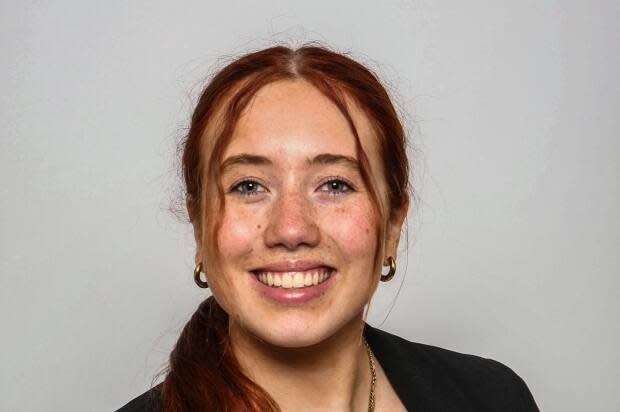Student EI program stopped, students in 'disbelief'

Eve Chamberlain didn't know the EI program for students was stopped until her friend called her in tears.
"It felt like the government was making it even harder for me to be able to go to university," she said Friday. "I immediately felt stress and panic of what am I going to do to be able to afford to do the next year."
Chamberlain used the New Brunswick Employment Insurance Connect program to help fund her living expenses while studying mechanical engineering at Université de Moncton.
The program made it possible for people who had worked enough hours in summer jobs to be eligible for employment insurance benefits to access them while at university or other training full time.
Chamberlain said her friend told her an email was sent out by the Université de Moncton student federation explaining the situation.

She immediately knew she had to take action.
"I told myself I had nothing to lose to try and start a petition," Chamberlain said. "I never expected it to take off as much. But this just indicates that a lot of students need this program and are willing to fight for it."
As of around 3 p.m. on Friday, the petition had over 12,000 signatures. Chamberlain said she was overwhelmed by the response.
When the petition has 15,000 names, Chamberlain plans to attach it to a formal letter she'll write to the New Brunswick government.
How did students find out?
The Department of Post-secondary Education, Training and Labour did not make a public announcement of the cut, choosing instead to send an email to some undisclosed recipients.
The U de M student group was one. Jean-Sebastien Leger, the president, said that after the email arrived Thursday morning, he with the provincial department shortly after with other representatives from other student unions.

"We had a big concern on the impact that will occur to the students all over their province," said Leger.
"We are quite worried about the impact on accessibility and the capacity of students, especially students that come from rural regions in New Brunswick, on whether they will be able to attend post-secondary education."
Leger said the federation decided to put out its own news release, which was shared on Facebook and emailed to students.
He predicted the cut will worsen the labour shortage in fields such as nursing. Nursing internships are unpaid and students often rely on the EI benefit for living expenses.
"Because of the internships, they cannot work 16 weeks in the summer, which is another crunch on their financial capability," he said.
More debt
Leger said the average debt for a New Brunswick graduate is $40,000, and this will go up without the EI program.
Maggie Hildebrand, a U de M student, already has a mortgage with her long-term partner, so debt is not new. But this is the first time she will need to take on student loan debt.
"I currently don't have any familial support for university, so I've applied for a student loan," she said. "I'm currently trying to find as many scholarships as I can, but that's kind of like playing a lottery."

Hildebrand said she didn't qualify for a student loan for a while because of her family's income, but now she does.
Hildebrand wanted to further her education after her undergraduate degree. She wants to go into health care, so she was considering a master's or nursing or medical school.
"I'm really questioning whether or not I can afford those options."
Students speak out
Hildebrand said she was in disbelief when she heard about the program, and went to the government's website to confirm it. There was nothing about it there.
She said she and her friends reached out to local politicians.
"We're students, we are their constituents for different MLAs, I would hope that they would take that seriously," said Hildebrand. "I would hope that they would try to reconsider and decide whether this is actually in the best interest of students."
Why not get a job?
Hildebrand, at the beginning of her degree in pre-med, took seven or eight classes per semester, more classes than the five required to be classified as a full-time student.
She said it just wasn't possible to work at the same time as school.
This year, Hildebrand only took a full course load and didn't overload, so she was able to get a job as a tutor. She only earned $69 every two weeks, so she still collected EI. Pre-pandemic, her EI was around $5,000 per year, but during the pandemic, benefits doubled for one year, so in 2021, she received about $12,000.
She said the amount she got from EI depended on the year and how much she made during the summer. Hildebrand always worked full-time or more in summers.
Province's response
Paul Bradley, acting director of communications for Post-Secondary Education, said the change brings New Brunswick practices in line with other provinces.
He said EI was never intended to fund post-secondary education or serve as a form of student aid.
He said the NB-EI Connect program fell outside the federal government's eligibility criteria for EI benefits.
"We have heard from many employers who are desperate for workers, especially those in the hospitality and service industry who would traditionally have access to students working part time," Bradley wrote.
Dropping out
Some students who had used the EI program are now having to make tough decisions.
Kayleigh Brewer, took out a loan to go to Dalhousie University, but it wasn't much. She said it's assumed if a student's parents make a certain amount of money, they'll contribute to their child's university payments, but that wasn't the case for Brewer.
"I was really devastated because for me, that program meant that I could go to school," she said. "Without it, I would have had to drop out."
Brewer said the next few weeks will be difficult as she figures out what to do.
"It just becomes so stressful because you're in an environment where you're just trying to start your life, you're trying to get a better education, you're trying to jump start on becoming independent," said Brewer.

 Yahoo Movies
Yahoo Movies 